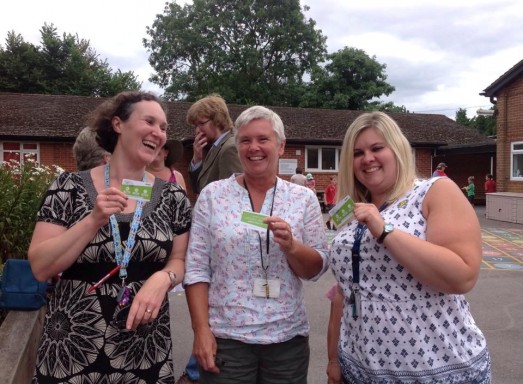UK community walks from “earth to moon” during Beat the Street 2014
30/07/2014

Following a successful pilot of the Beat the Street walk to school initiative in the Caversham area of North Reading, UK, in 2013, local clinical commissioning groups for Reading rolled the project out across its whole population of 150,000 people in 2014. After almost three months, Beat the Street Reading 2014 came to an exciting finale on Tuesday 22 July with the announcement that 15,000 people had walked 244,537 miles (393,544 km) in 8 weeks. This was arguably one the biggest and most successful active participation projects in the UK, the project’s director Veronica Reynolds from Intelligent Health writes.
The idea of Beat the Street is to encourage people to walk more to school, to work, to the shops and around their local area by taking part in a fun game. People earn points by tapping an RFID card against special readers or ‘Beat Boxes’, which are placed approximately 0.5 miles (0.8 km) apart. The participants win prizes for themselves and for their community team by using their Beat the Street cards. Teams can be schools, workplaces or community groups. The teams that earn the most points win cash prizes for their chosen charity or cause (this is compiled on average scores, rather than largest number of entrants).
This year in Reading, 130 Beat Boxes were placed on lamp posts: an area of approximately 15 square miles (24 square km). The target was set for the whole of Reading to walk the distance from the earth to the moon - 238,000 miles (383,023 km). Their incredible achievement of this goal came from over fifty teams including workplaces and thirty primary schools.
Rod Smith, chair of the North and West Reading Clinical Commissioning Group that funded the project, said he was pleased with the results:
“Beat the Street has added a competitive and exciting element to getting active. We’ve been hugely impressed that so many people in Reading have walked, run and cycled their way to fitness and have enjoyed hearing stories of people that have literally gone the extra mile in pursuit of the goal of reaching the moon. Hopefully, the Beat the Street project has encouraged many people to make daily activity a life-long habit.”
Beat the Street is currently being evaluated to measure participants’ behaviour change during and three months after the competition ends. It will look at the impact of Beat the Street on individuals’ physical activity levels and their levels of walking or cycling versus taking the car.
Qualitative feedback suggests that the initiative has helped parents to get their children out and active and to start to feel the benefits of an active journey to school. It is hoped that, due to the very large number of participants involved, a sufficient number of these will continue to be more active in order for the project to demonstrate a return on investment in health care costs and potentially reductions in carbon emissions. Full evaluation reports will be ready in October 2014, showing the three-month follow-up data.
Intelligent Health founder who created Beat the Street, Dr. William Bird, said that their initial survey results were encouraging:
“Reading residents have really got behind this challenge and pushed themselves to get moving. Early indications of our survey results show a 10 per cent increase in the people who described themselves as inactive before the competition, meeting the recommended activity levels by the end of the competition. This is very exciting for us and our NHS funding partners. The issue of inactivity costs the region millions of pounds, so Reading has hopefully had fun but will also see the cost and individual benefits of getting active.”
Further Beat the Street projects have been running in Thurrock, Essex in June and July 2014 with 14,000 people and 52 schools walking 70,126 miles (112,857 km). A smaller project in the East of Norwich succeeded in walking around the world. Future Beat the Street projects have been confirmed for 2015 in Athens, Greece, Terni in Italy, New York, Hounslow (London) and Gdansk.
Read more about Beat the Street Reading here
Behind Beat the Street
Beat the Street is run by Intelligent Health. Intelligent Health is a Health IT Company founded by Dr. William Bird MBE to work with public sector health organisations and corporate partners both in the UK and around the world to tackle the massive global problem of inactivity. Dr. William Bird has pioneered the research and promotion of physical activity and exercise schemes as a health benefit for over 30 years. Veronica Reynolds gave a presentation on Beat the Street on behalf of Intelligent Health at ISCA’s MOVE Congress in 2013 and Dr. Bird presented the latest results at the ACTIVE Network closing conference in June 2014.
For more information about Intelligent Health visit http://www.intelligenthealth.co.uk
Posted on 30/07/2014 by Veronica Reynolds, Intelligent Health

